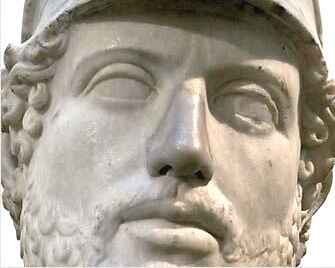Thucydides Roundtable Book III: The Most Violent Man at Athens
Thursday, November 3rd, 2016[Mark Safranski / “zen“]
Cleon, son of Cleanetus, strategos and demagogue of Athens
“….Cleon was the first to shout during a speech in the Assembly, use abusive language while addressing the people, and hitch up his skirts [move around dramatically]”
– Aristotle
“….As a furious torrent you have overthrown our city; your outcries have deafened Athens”
– Aristophanes
This will be a shorter post as I am still working on Part II of Pericles, Strategy and his Regime from Book II. It seemed useful in Book III to turn our attention to Pericles’ nemesis and antithesis, Cleon.
Cleon, who dominated the Assembly for a time after the death of Pericles is an archetype for two figures who appear in many times and places, especially in times of civil strife, war and revolution – the populist demagogue and the extremist hardliner. Thucydides, who clearly despised Cleon, called him “the most violent man at Athens” and Cleon’s brutal style of politics seemed to have been a mixture of natural temperament, radicalism and tactical convenience. Aristophanes lampooned Cleon as an angry, malevolent, bawling, buffoon and this may have been because the playwright had been a victim of one of Cleon’s many malicious lawsuits and public prosecutions with which he harassed his political enemies. Although wealthy, Cleon came “from the marketplace” – today we might say “blue collar” – and his power base was among the poorest classes of the thetes. Often scorned by haughty Athenian elites for his coarsely vulgar and histrionic oratory, I can imagine that the oarsmen, dockworkers, tradesmen and shipwrights of Athens felt that Cleon “spoke their language”.
To whomever he was speaking, the counsel of Cleon reveled in blood and iron:
“I have often before now been convinced that a democracy is incapable of empire, and never more so than by your present change of mind in the matter of Mitylene. Fears or plots being unknown to you in your daily relations with each other, you feel just the same with regard to your allies, and never reflect that the mistakes into which you may be led by listening to their appeals, or by giving way to your own compassion, are full of danger to yourselves, and bring you no thanks for your weakness from your allies; entirely forgetting that your empire is a despotism and your subjects disaffected conspirators, whose obedience is ensured not by your suicidal concessions, but by the superiority given you by your own strength and not their loyalty. The most alarming feature in the case is the constant change of measures with which we appear to be threatened, and our seeming ignorance of the fact that bad laws which are never changed are better for a city than good ones that have no authority; that unlearned loyalty is more serviceable than quick-witted insubordination; and that ordinary men usually manage public affairs better than their more gifted fellows. The latter are always wanting to appear wiser than the laws, and to overrule every proposition brought forward, thinking that they cannot show their wit in more important matters, and by such behaviour too often ruin their country; while those who mistrust their own cleverness are content to be less learned than the laws, and less able to pick holes in the speech of a good speaker; and being fair judges rather than rival athletes, generally conduct affairs successfully. These we ought to imitate, instead of being led on by cleverness and intellectual rivalry to advise your people against our real opinions.
…..Our mistake has been to distinguish the Mitylenians as we have done: had they been long ago treated like the rest, they never would have so far forgotten themselves, human nature being as surely made arrogant by consideration as it is awed by firmness. Let them now therefore be punished as their crime requires, and do not, while you condemn the aristocracy, absolve the people. This is certain, that all attacked you without distinction, although they might have come over to us and been now again in possession of their city. But no, they thought it safer to throw in their lot with the aristocracy and so joined their rebellion! Consider therefore: if you subject to the same punishment the ally who is forced to rebel by the enemy, and him who does so by his own free choice, which of them, think you, is there that will not rebel upon the slightest pretext; when the reward of success is freedom, and the penalty of failure nothing so very terrible? We meanwhile shall have to risk our money and our lives against one state after another; and if successful, shall receive a ruined town from which we can no longer draw the revenue upon which our strength depends; while if unsuccessful, we shall have an enemy the more upon our hands, and shall spend the time that might be employed in combating our existing foes in warring with our own allies.
“No hope, therefore, that rhetoric may instil or money purchase, of the mercy due to human infirmity must be held out to the Mitylenians. Their offence was not involuntary, but of malice and deliberate; and mercy is only for unwilling offenders. I therefore, now as before, persist against your reversing your first decision, or giving way to the three failings most fatal to empire—pity, sentiment, and indulgence. [….] Punish them as they deserve, and teach your other allies by a striking example that the penalty of rebellion is death. Let them once understand this and you will not have so often to neglect your enemies while you are fighting with your own confederates.”
It had been Cleon, of course, who had originally moved that Athens should punish rebellious Mytilene by putting all of its citizens to death and subsequently spoke against reversing that decree. He failed but only by a slender chance of a speedy messenger was the massacre averted.
War tends to throw up into posterity characters ill-suited for a successful life in times of peace. And when in times of peace they tend to plot and agitate for war and civil disorder. The anti-Nazi journalist Konrad Heiden called them “armed intellectuals” and their more violent cousins “armed bohemians”; Eric Hoffer, author of The True Believer developed a similar typology, “fanatics” and “practical men of action”. Cleon was such a man, I believe, and his constant incitement and advocacy of the severest measures corrupted the Athenian democracy and changed its character to mistake cruelty for strength and reckless aggression for courage. Worse, this acted in tandem with the Spartans, of whom it must be said they were the first and not the Athenians to deviate from traditional Greek customs of restrained warfare against fellow Greeks and make casual massacre and atrocity a war policy.
An escalatory dynamic that made the Peloponnesian War unprecedented in scale and barbarism for the Hellenic world.






